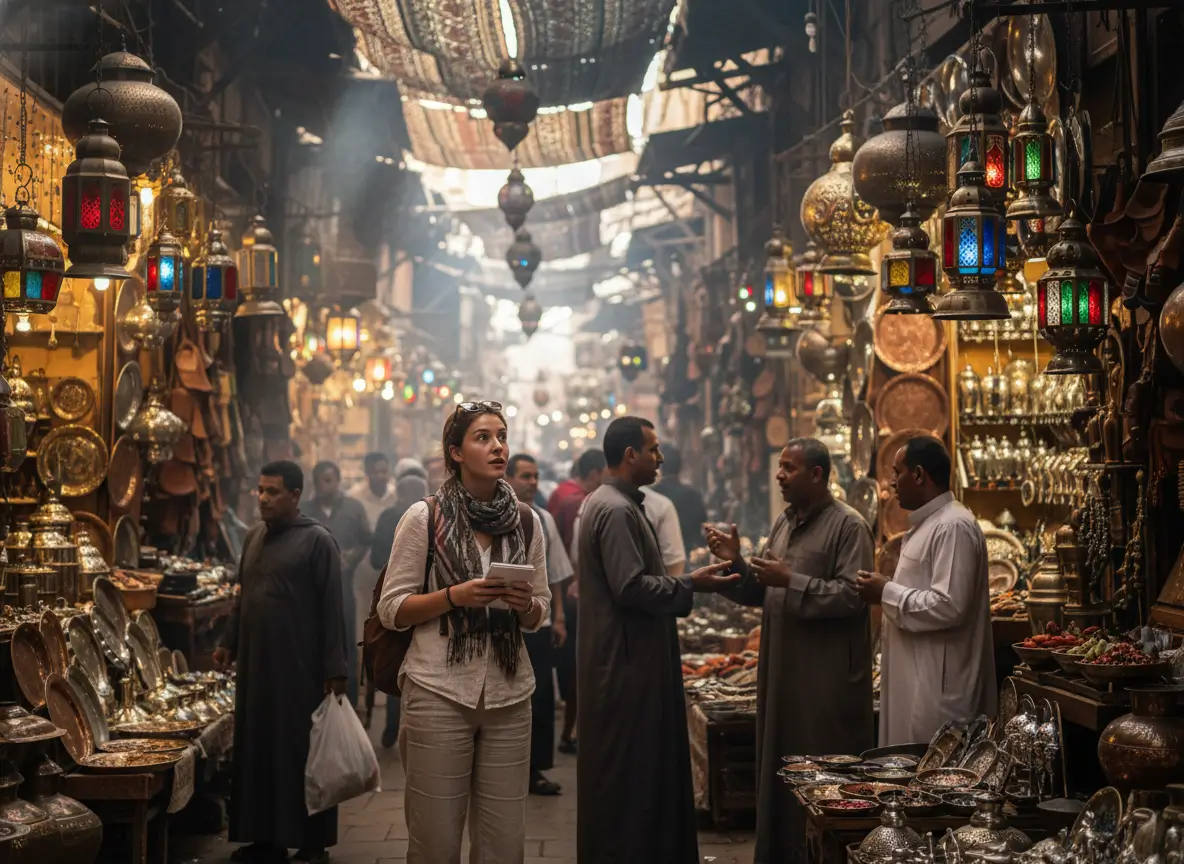Speak Egyptian Arabic
Like a Cairo Native
Stop sounding like a textbook. Start sounding like an Egyptian.
5,000+ students already speak REAL Egyptian Colloquial Arabic.
Tried Arabic Before? We Know What Went Wrong.
- You learned formal Arabic that nobody actually speaks
- Teachers taught grammar rules instead of conversation
- You can read letters but can’t order food in Cairo
- After months of study, Egyptians STILL don’t understand you
- Ordering koshari in perfect Egyptian slang
- Joking with Cairo taxi drivers like old friends
- Watching Egyptian movies without subtitles
- Egyptians asking “Wait, you’re not Egyptian?!”
That’s what happens in 8 weeks with us.
Not Just “Native Speakers” – Real Egyptians
Born and raised in Cairo, Alexandria, or the Nile Delta. This is the Arabic they actually speak.
Cairo Accent
Street slang, idioms, jokes. The way Egyptians ACTUALLY talk.
5-10 Years Experience
Teaching foreigners Egyptian specifically. Fluent in English.
Culture & Humor
You don’t just speak Egyptian – you THINK Egyptian.
✨ Why This Course Actually Works
Three secrets. Zero theory. All conversation.
Speak from Minute 1
No alphabet. No grammar charts. Lesson 1, Minute 1: “إزيك؟ إزّيك؟” You speak immediately.
Learn Through Egyptian Life
Movies, comedy clips, songs (Amr Diab), memes, TikTok trends. You learn what Egyptians actually consume.
Culture & Body Language
Hand gestures, social rules, unwritten etiquette. You don’t just speak – you belong.
⏳ Your 8-Week Timeline
From tourist to “You’re Egyptian, right?!”
Survive
Greetings, food, directions. Order koshari like a local.
Connect
Small talk, bargain in markets, make Egyptian friends.
Sound Egyptian
Real conversations, understand movies, use slang.
📚 What You’ll Actually Learn
Three levels. Clear milestones. Real Egyptian.
Level 1: Survival
- ✓ Greetings & introductions
- ✓ Getting around Cairo
- ✓ Food & restaurant talk
- ✓ Market bargaining
Level 2: Social
- ✓ Daily conversations
- ✓ Express feelings
- ✓ Egyptian idioms
- ✓ Text in slang
Level 3: Native Flow
- ✓ Sarcasm & Egyptian wit
- ✓ Regional accents
- ✓ Current slang
- ✓ Fool Egyptians
💬 Real Students, Real Results
5,000+ students from 80+ countries. 4.9/5 rating.
“After 6 weeks, I walked into a Cairo restaurant and ordered entirely in Egyptian. The waiter was SHOCKED I wasn’t Egyptian!”
“I tried 3 other Arabic courses before this. This is the ONLY one that actually got me speaking.”
“My Egyptian husband can’t believe how good my accent is. Worth every penny!”
💰 Honest Pricing. No Surprises.
All plans include: 1-on-1 • Free materials • Lifetime recordings • 24/7 support • Certificate
🎁 Special Egyptian Offer
3 months → 10% off | 6 months → 20% off
Enter discount code in coupon field
🛡️ You Risk Nothing. We Promise.
Egyptian saying: “جرّب وشوف” (Try and see). That’s all we ask.
Free Trial
60-minute lesson. Real Egyptian teacher. Zero cost.
14-Day Guarantee
Not satisfied? Full refund. No questions asked.
Complete Flexibility
Switch teachers, reschedule, pause. No penalties.
❓ أسئلة شائعة
Quick answers. No fluff.
Do I need to know the Arabic alphabet?
No! We teach using transliteration (Latin letters) if needed. Many students learn purely by ear.
How long until I can speak?
Week 1: Basic phrases. Week 4: Simple conversations. Week 8: Fluent chatting and Egyptian media.
Is this the Arabic real Egyptians speak?
100% YES. This is exactly how Egyptians talk every day. No formal textbook Arabic.
Is there a free trial?
Yes! 60-minute free trial with a real Egyptian teacher. No credit card required. Zero risk.
Ready to Speak Egyptian?
👨🏽🍳: “إزيك يا باشا؟ عايز إيه؟”
YOU: “تمام الحمد لله! عايز كشري كبير لو سمحت”
👨🏽🍳: “انت مصري؟!”
YOU: “لأ، بس بحب مصر!”
This isn’t fantasy. This is our students.
✨ No credit card • Zero commitment • 60 minutes with a real Egyptian

